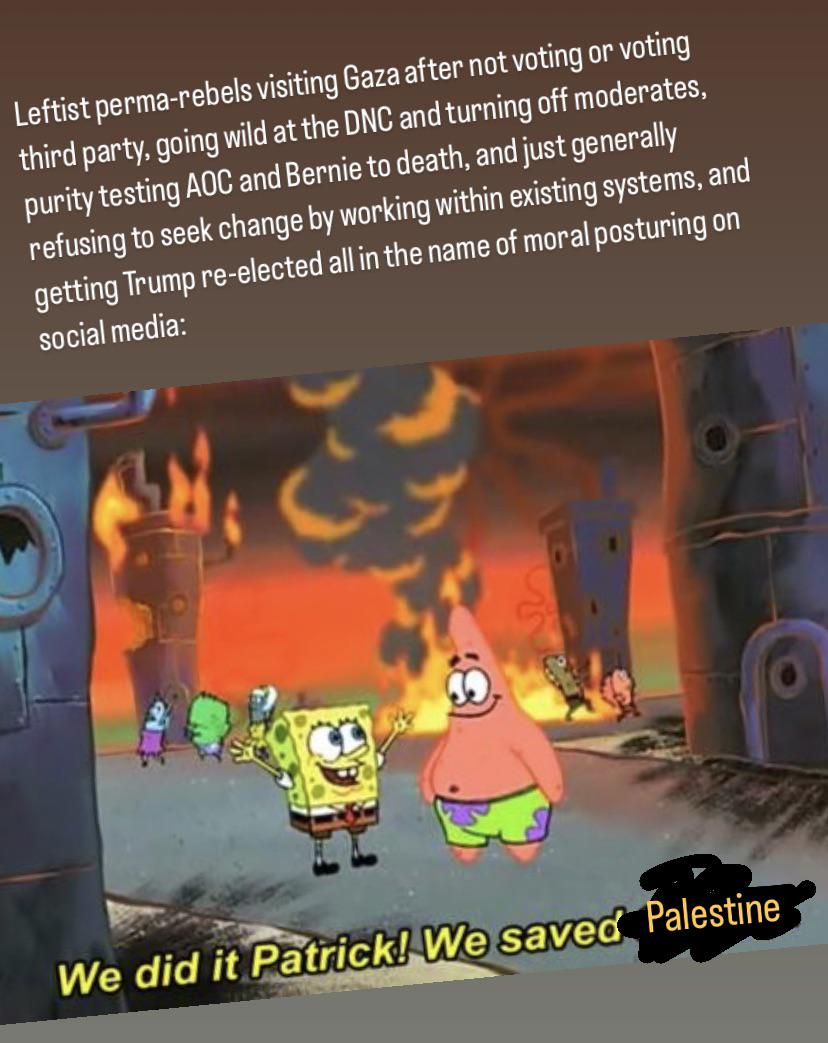311
you are viewing a single comment's thread
view the rest of the comments
view the rest of the comments
this post was submitted on 15 Jul 2024
311 points (85.7% liked)
Political Memes
5391 readers
2507 users here now
Welcome to politcal memes!
These are our rules:
Be civil
Jokes are okay, but don’t intentionally harass or disturb any member of our community. Sexism, racism and bigotry are not allowed. Good faith argumentation only. No posts discouraging people to vote or shaming people for voting.
No misinformation
Don’t post any intentional misinformation. When asked by mods, provide sources for any claims you make.
Posts should be memes
Random pictures do not qualify as memes. Relevance to politics is required.
No bots, spam or self-promotion
Follow instance rules, ask for your bot to be allowed on this community.
founded 1 year ago
MODERATORS

Leftists need to understand that the US is not a leftist country, and they will always, always, always be disappointed by our government.
Hell, they'll be disappointed by our populace.
Tbf most leftists seem to define leftist by differing qualities. To one you're leftist as long as you aren't racist/-phobic, to another that non-racist liberal isn't a leftist because they don't want to murder landlords in the street for the crime of renting out a house (or, y'know, kidnap a rich teen, rob a few banks, pull some unsuccessful bombings, kill the first black school superintendent and a few more people, and die in a shootout with the cops. "Death to the fascist insect that preys upon the life of the people" and all that).
The more tame example may reach a day where they are at least less upset, maybe even happy. The reactionary murderer example will never be happy because the problem is inside themselves but they externalize it as "kill and murder people I don't like," and yeah ain't nobody going for it. And of course it isn't just those two, it's a spectrum, but ykwim.
This is exactly why you need a functioning multi-party system to breed steady progress and trust in political institutions. With a multi party system you will have fringe parties getting a couple percent of the vote.
For example in Norway, the party "Red", which is literally a communist party with armed revolution as part of its official party programme, regularly gets like 3% of the vote, and more-or-less nazi party that get <1%. Then you have a bit more moderate parties that get maybe 10%, before you get to the classic "labour" and "conservative" parties, which gets 20-30% each, and a couple "center" parties with ≈5-8%.
The point is that when one of the extreme (or centrist) parties suddenly starts growing, the big parties are forced to change their policies to regain votes. This also means that a typical government is a coalition between several parties, where the distribution of power between those parties is representative of the vote. For example, one election the not-so-extreme left party could get 12%, forcing the larger Labour Party to tend left on a lot of issues to gather enough support.
In short: A functioning multi-party system with coalitions favours nuance and gradual political change, rather than a black-and-white, polarised system. At the same time, everyone can see that their views are actually represented in the parliament, because even if they have extreme views, they have a party to represent them. Over time, this likely makes people less likely to grow even more extreme, but encourages them to vote and work within the political system, while recognising that their views only hold 1-5% support in the population.